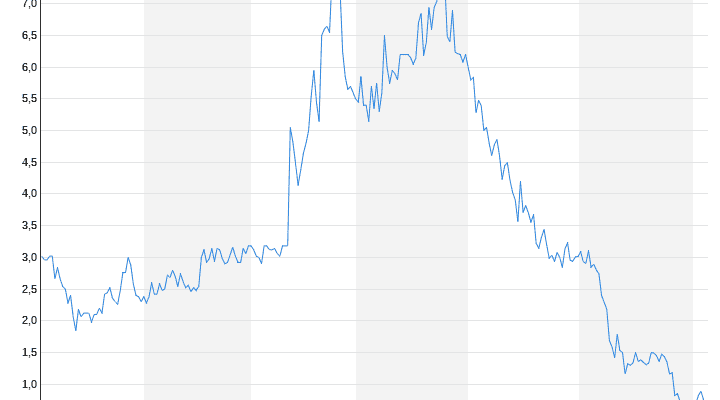Wednesday, September 8th, 2021
China Evergrande is shaking
China’s real estate giant threatens debt disaster
China’s second largest real estate developer is in serious trouble and will have to pay off $ 37 billion in debt in the next year alone. Should Evergrande collapse under the mountain of debt, it could send shock waves through the Chinese banking system.
The situation for the debt-laden Chinese real estate group China Evergrande is becoming more and more threatening. The rating agency Fitch has now downgraded its credit rating for the group and two of its subsidiaries due to the risk of impending payment defaults. The step “reflects our view that a failure in some form seems likely,” it said to justify. “We believe credit risk is high with tight liquidity, declining contract sales, pressures of late payments to suppliers and contractors, and limited progress in selling assets.”
The background: The Chinese authorities have been putting more and more industries on the curb for months – including the real estate sector. The regulator enacted hundreds of new rules and restricted borrowing and land purchases to cool the booming housing market. But not only prices came under pressure, but also real estate companies. Loan defaults and bankruptcies followed. Experts are now warning of the effects on the financial sector and the country’s economy as a whole.
While the rate of bad loans at the Chinese commercial banks was overall stable at a low level of 1.76 percent in the past quarter, according to the supervision, the picture is different for individual institutions and with a view to the housing market: The Ping An Bank in Shenzen, for example, burst three times as many loans in the real estate sector in the first half of 2021 as a year ago. The Bank of Jinzhou saw an increase of more than 50 percent and the Bank of Shanghai more than 25 percent. According to insolvency courts, 220 real estate companies have filed for bankruptcy this year, so there were continuous bankruptcies in the industry in the previous year.
The real estate market accounts for around a quarter of the Chinese economy. A lush flow of credit fueled the boom in the industry for years. The real estate developer Evergrande has long been the symbol of this high-altitude flight. Now the industry giant from Guangdong stands for the downward spiral into which many developers have slipped. Under the pressure of falling profits, the company is struggling to refinance loans. S&P Global estimates the debt Evergrande will have to repay next year at $ 37 billion.
Share crashes
Before Fitch, the rating agencies Moody’s and the domestic China Chengxin International (CCXI) had also lowered their rating of Evergrande. About a week ago, the country’s second largest real estate developer himself warned of liquidity and default risks if he should not be able to resume construction, sell holdings and renew loans.
Unrest is growing in the financial markets. Evergrande’s shares, listed in Hong Kong, fell to a six-year low at times today, but then closed more than four percent up. Since the beginning of the month, however, they have lost 15 percent, the minus since the beginning of the year is more than 76 percent. “We anticipate the company’s deleveraging path will be bumpy, which could result in heavy discounts on its property sales and potential asset disposals,” said Goldman Sachs analysts.
On the bond markets, the price of a bond of the company that runs until May 2023 and bears 5.9 percent interest fell by a further 2.8 percent after a drop of more than 50 percent since last week. The bonds of other Chinese real estate groups also fell significantly in value. At times, the Chinese stock exchange had to suspend trading in bonds a few days ago due to price turbulence.
$ 300 billion in debt
While Evergrande has no bonds with a term until 2021, Fitch estimates that the company will have to make interest payments on bonds of $ 129 million in September alone and $ 850 million before the end of the year. In June, Evergrande defaulted on bond interest payments, which accelerated the slump on the stock markets.
The company is also struggling with due payments to suppliers. Evergrande, for example, had an outstanding debt of 562 million yuan (US $ 87 million) to its supplier Skshu Paint at the end of August. Overall, the real estate company should sit on a mountain of debt equivalent to more than 300 billion dollars.
Investors fear shock waves for the Chinese banking system if Evergrande collapses. “Its huge balance sheet will have a real ripple effect on China,” said Nomura economist Lu Ting. “When financial institutions lose money, they will cut back on lending to other companies and sectors.” According to industry observers, however, there are now clear signs that the authorities are stepping to avoid a hard landing on Evergrande, fearing the “social effects” of a collapse.
.
